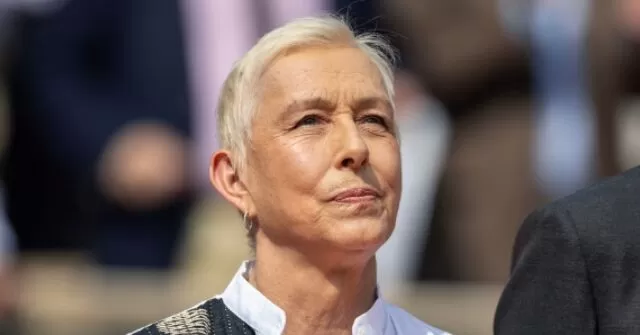Tennis great and women’s sports advocate Martina Navratilova has never been one to shy away from controversial topics. Known for her fearless approach to speaking her mind, Navratilova has recently made headlines for blasting the Paralympics for allowing transgender athletes to compete as women.
In a post on her social media platform, Navratilova expressed her disappointment and frustration with the Paralympic committee, calling them “pathetic cheaters.” The cause of her outburst was the participation of a transgender sprinter in the Paralympic Games, set to take place later this year.
In her post, Navratilova accused the Paralympic committee of allowing biological males to compete as females, completely disregarding the physiological and physical advantages that males have over females. She argued that this decision goes against the very principles of fair competition and undermines the integrity of women’s sports.
Navratilova is not the only one speaking out against the inclusion of transgender athletes in women’s sports. Many athletes and sports enthusiasts have raised concerns over the potential impact on fairness and competitiveness of female sports.
The debate around the inclusion of transgender athletes in sports has been ongoing for a while now. While some argue that everyone should be allowed to compete in the sports they identify with, others argue that it goes against the concept of fair play and creates an unlevel playing field.
But Navratilova’s outspoken stance on this issue is not surprising. As a pioneer for women’s sports and a member of the LGBTQ+ community herself, she has always been passionate about fighting for equality and fairness in sports. In a world where women’s sports have often been overshadowed by men’s sports, Navratilova has been a vocal advocate for leveling the playing field and giving women the recognition they deserve.
It is important to acknowledge that the inclusion of transgender athletes in sports is a sensitive and complex issue. While it is crucial to respect the rights and identities of transgender individuals, it is also essential to consider the implications of their participation in sports, especially in competitive events like the Paralympic Games.
The Paralympics is a platform for athletes with disabilities to showcase their talent and compete in fair and equal conditions. The Paralympic committee’s decision to allow transgender athletes to compete as women has sparked outrage among many athletes who feel that it goes against the spirit of the games.
One of the main concerns raised by Navratilova and others is the physical advantages that biological males may have over females. Testosterone, a hormone found in males, gives them more strength and endurance, which can be a significant advantage in sports competitions. This biological difference makes it challenging to ensure fair competition in sports when transgender athletes are allowed to participate as female.
The Paralympic committee’s decision to allow transgender athletes in women’s sports is a move that needs to be carefully considered. While it is essential to support inclusivity and diversity, it is equally crucial to ensure that fairness and equality are not compromised.
Navratilova’s strong words and bold stance have sparked a much-needed debate about the inclusion of transgender athletes in sports. It serves as a reminder that while it is crucial to respect individual rights, we must also consider the impact of our actions on the integrity of sports and fair competition.
It is time for the Paralympic committee and other sports organizations to have a serious conversation about the guidelines and regulations surrounding the inclusion of transgender athletes in sports. Transgender individuals deserve to have their identities respected, and women’s sports should continue to thrive, with fair and equal opportunities for all athletes.
In conclusion, Martina Navratilova’s criticism of the Paralympics for allowing transgender athletes to compete as women has sparked an important conversation about inclusion and fairness in sports. While her remarks may be controversial, they highlight the need for a thoughtful and transparent approach to addressing this complex issue. As we move towards a more inclusive society, it is crucial to ensure that we do not compromise the integrity of sports, and all athletes, regardless of their gender identities, have an equal chance to compete fairly.





![Complete BritRail Pass Guide [Types, How to Use It, Pros + Cons]](https://inside-news.uk/wp-content/uploads/2025/06/00221EB4-BCA2-4DBB-6CD4-83DBC37D71FA-120x86.webp)












